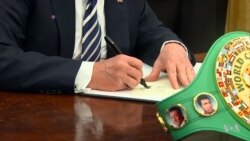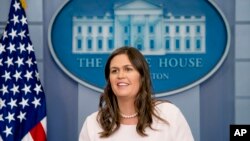ປະທານາທິບໍດີສະຫະລັດ ທ່ານດໍໂນລ ທຣໍາ ໃນວັນຈັນວານນີ້ ໄດ້ປະກາດອອກໄປວ່າ
“ຂ້າພະເຈົ້າມີສິດອຳນາດຢ່າງສົມບູນ” ທີ່ຈະອະໄພໂທດໃຫ້ທ່ານເອງ ແລະຕໍ່ມາ ຍັງໄດ້
ຂຽນລົງໃນທວິດເຕີວ່າ ການສືບສວນຂອງລັດຖະບານກາງ ກ່ຽວກັບ ຄວາມສຳພັນ
ລະຫວ່າງຄະນະໂຄສະນາຫາສຽງເລືອກຂອງທ່ານໃນປີ 2016 ແລະຣັດເຊຍນັ້ນແມ່ນ
“ຜິດລັດຖະທຳມານູນຢ່າງແນ່ນອນ.”
ໃນຂະນະທີ່ປະທານາທິບໍດີທຣຳ ໄດ້ເມີນເສີຍຢູ່ເລື້ອຍໆ ຕໍ່ລະບຽບການທີ່ມີການສ້າງຕັ້ງ
ແບບປົກກະຕິ ແລະທ້າທາຍ ເຖິງຄວາມເຂົ້າໃຈ ກ່ຽວກັບອຳນາດຂອງປະທານາທິບໍດີທີ່
ມີຢູ່ຢ່າງຈຳກັດນັ້ນ, ຄວາມເຫັນອັນຫຼ້າສຸດຂອງທ່ານ ແມ່ນຖືກມອງເຫັນວ່າ ໂດຍພວກ
ນັກປາດດ້ານກົດໝາຍວ່າ ບໍ່ເຄີຍມີມາກ່ອນ ແລະ ເປັນການທົດສອບຕໍ່ຂອບເຂດຂອງ
ລັດຖະທຳມານູນ.
“ຂ້າພະເຈົ້າແມ່ນຕື່ນຕົກໃຈ” ຈາກຂໍ້ຄວາມໃນທວິດເຕີຂອງທ່ານທຣຳ,” ຊຶ່ງທ່ານ
ນາງຊູແຊນ ບລອດຈ໌ ອາຈານສອນກົດໝາຍ ທີ່ມະຫາວິທະຍາໄລຈອຣ໌ຈທາວນ໌
ໄດ້ກ່າວໄວ້.
“ຍັງບໍ່ ທັນມີປະທານາທິບໍດີຄົນໃດ ໄດ້ພະຍາຍາມແບບນີ້ເທື່ອ,” ນັ້ນຄືຄຳເວົ້າຂອງ
ທ່ານນາງ ໄດ້ບອກກັບວີໂອເອ ແລະໄດ້ກ່າວຕໍ່ໄປວ່າ “ມັນບໍ່ເບິ່ງຄືວ່າ ປະທານາທິບໍດີ
ສາມາດຈະສາມາດ ໃຫ້ອະໄພຍະໂທດແກ່ທ່ານເອງໄດ້. ຂ້າພະເຈົ້າຄິດວ່າ ສານ
ຕ້ອງກ່າວວ່າ ບໍ່” ແລະຖ້າຫາກທ່ານໃຫ້ອະໄພຍະໂທດແກ່ທ່ານເອງແລ້ວນັ້ນ,
“ພວກສະມາຊິກລັດຖະສະພາສ່ວນໃຫຍ່ ກໍຈະຟ້ອງທ່ານ.”
ທ່ານນາງ ບລອດຈ໌ ຍັງໃຫ້ຂໍ້ສັງເກດວ່າ ຜູ້ຄົນສ່ວນໃຫຍ່ ຍອມຮັບການໃຫ້ອະໄພຍະ
ໂທດ“ມັນເປັນການກະທຳຄວາມຜິດ,” ເຖິງແມ່ນວ່າ ມັນແມ່ນຄວາມຄິດທີ່ບໍ່ດີ ສຳລັບ
ທ່ານທຣຳທີ່ຈະສືບຕໍ່ໃນການເອົາບາດກ້າວທີ່ວ່ານີ້.
ອາຈານ ຜູ້ທີ່ໄດ້ໃຫ້ການຕໍ່ສະພາສູງກ່ອນໜ້ານີ້ ກ່ຽວກັບວ່າ ປະທານາທິບໍດີ ສາມາດ
ທີ່ຈະຖືກຟ້ອງຮ້ອງ ແລະດຳເນີນຄະດີໄດ້ຫຼືບໍ່ ໃນຂະນະທີ່ທ່ານຍັງດຳລົງຕຳແໜ່ງຢູ່ນັ້ນ,
ກ່າວວ່າ ໄອຍະການພິເສດ ແມ່ນມີ “ສິດອຳນາດຢ່າງເດັດຂາດຕາມລັດຖະທຳມະນູນ.”
ນັກປາດອີກທ່ານນຶ່ງ ທ່ານຄິດທ໌ ໄວທິງທັນ (Keith Whittington) ທີ່ມະຫາວະຍາໄລ
ປຣິນສຕັນ ກ່າວວ່າ “ຂ້າພະເຈົ້າຄິດວ່າ ມັນສຳຄັນ ທີ່ຈະຮູ້ວ່າ ຄວາມເຫັນຂອງ
ປະທານາທິບໍດີ ແມ່ນອ້າງເຖິງການໂຕ້ຖຽງທີ່ຮ້າຍແຮງ ທີ່ໄດ້ໂຕ້ຖຽງກັນ ໂດຍພວກ
ນັກປາດ, ແຕ່ວ່າ ມັນເປັນການຍາກຫຼາຍ ແລະບໍ່ແມ່ນຄຳຖາມກ່ຽວກັບລັດຖະທຳ
ມະນູນທີ່ຈະຕ້ອງໄດ້ຮັບຄຳຕອບໃນທີ່ສຸດ ຢູ່ທີ່ສານ.”
“ທ່າທີຂອງທ່ານທຣໍາ ໃນການອະໄພໂທດ ແມ່ນສອດຄ່ອງກັບກົດໝາຍລັດຖະທຳ
ມະນູນແຕ່ວ່າ ບໍ່ສອດຄ່ອງກັບ ໂຄງສ້າງທັງໝົດຂອງມັນ,” ນັ້ນຄືຄຳເວົ້າຂອງ ທ່ານ
ແອນດຣູ ຄອບໂປແມນ ອາຈານສອນສອນກົດໝາຍທີ່ມະຫາວິທະຍາໄລນອຕ໌ແວສເທີນ
ບອກກັບ ອົງການຂ່າວວີໂອເອໄວ້ ແລະທ່ານຍັງກ່າວຕໍ່ໄປວ່າ “ມັນໝາຍຄວາມວ່າ ປະທານາທິບໍດີ ໄດ້ກະທຳຜິດຢ່າງຮ້າຍແຮງທາງດ້ານການເງິນ ຫຼືບໍ່ ຄະດີອາຍາ
ອື່ນໆຕໍ່ລັດຖະບານກາງ ແລະຫລັງຈາກນັ້ນ ກໍສາມາດທີ່ອະໄພຍະໂທດແກ່ທ່ານເອງ.”
ອ່ານຂ່າວນີ້ເພີ່ມຕື່ມເປັນພາສາອັງກິດ
U.S. President Donald Trump on Monday declared he has an "absolute right" to pardon himself and then also tweeted his assertion that the federal government's investigation into ties between his 2016 election campaign and Russia is "totally unconstitutional." Details from VOA's White House bureau chief, Steve Herman.
Since his arrival at the White House 500 days ago, President Trump has frequently ignored established norms and challenged the understood limits of presidential powers. But his latest comments, especially on pardoning himself, are eliciting surprise and intense debate in legal circles.
"I think it's unlikely that the president can pardon himself. I think the court would say no. But I also think that if the president pardons himself, most Congresses would impeach him."
Trump's legal team, however, now appears to be pursuing an aggressive legal view that presidential authority is so sweeping he has the power to end the special probe of his campaign or just give himself a pardon more akin to a king than a democratically elected president.
And that prompted pointed questions on Monday to the White House press secretary.
"Does the president believe that he is above the law?"
"Uh, certainly not. The president hasn't done anything wrong "
"The question isn't if he has done anything wrong. I guess the question is does the president believe the framers (of the Constitution) envisioned a system where the president can pardon himself -- where the president could be above the law?
"Certainly, the Constitution very clearly lays out the law. And once again the president hasn't done anything wrong and we feel very comfortable on that front."
Trump's lawyers, in a long letter in January to the special counsel that has emerged in recent days, contended the president cannot be compelled to testify through a subpoena and argued he could not have obstructed justice by firing the FBI director, who was leading the Russia probe, because the president has unlimited power to terminate the investigation.
Trump continues to term the yearlong investigation a "never ending Witch Hunt."






